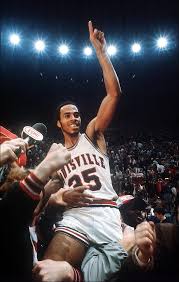In any other year early-April would be a time for reflecting on the Elite 8 and looking forward to the Final 4, but this year is not like any other year. Instead, we will spend the week reflecting on champions of the past, from a famous coach who won the 1947 NCAA title as a player to a Hall of Famer who led her team to a perfect 34-0 season in 1986. HoopsHD’s Jon Teitel continues our 8-part series with Darrell Griffith, who talked about winning the 1980 NCAA tourney and being inducted into the College Basketball Hall of Fame in 2014.
You were nicknamed “Dr. Dunkenstein”: is it true that the nickname was based on a George Clinton character called Dr. Funkenstein, and is it true that you had a 48” vertical leap? It was indeed inspired by Dr. Funkenstein: my brother was a big fan of P-Funk. That was my actual vertical leap: they measured me that high during the Olympic trials.
In the 1978 NCAA tourney you scored 19 PTS in a 1-PT 2-OT loss to DePaul (who was led by Dave Corzine’s 46 PTS): where does Corzine’s performance rank among the best you have ever seen? I have long forgotten that loss: if we had won then we would have played Notre Dame. Dave was a former teammate of mine and had a good performance that night.
In 1980 as the lone senior starter for coach Denny Crum you were named All-American and won the Wooden Award: did you feel that your team was too young to make a championship run that year? Not at all: we had a lot of tough guys who played together all summer long and we matured as a group.
Take me through the magical 1980 NCAA tourney:
You had 18 PTS/8 AST before fouling out in a 2-PT OT win over Kansas State after Rolando Blackman made a shot at the end of regulation and Tony Branch made a jumper with 1 second left in OT: where does that rank among the most exciting games you have ever played in? It is probably not 1 of the most exciting games…but it was very memorable because it could have been my last college game if we had lost. Tony was my roommate on the road and made a clutch shot that allowed us to move on.
You had 17 PTS/7 AST in a win over LSU: what did you talk about at dinner the night before the game with your friend/LSU captain Rudy Macklin, and what did you say to him afterward? Rudy is 1 of my best friends so we just talked about going out, playing hard, and having the best man win. Rudy is from Louisville so he would come home during the summers and play with our team: he was an awesome player. After the game he hugged me and wished me well, just like any great friend would.
You scored 23 PTS in a 5-PT win over UCLA en route to being named tourney MOP and winning the title: what did it mean to you to win a title, and what kind of inspiration did you gain from your childhood friend Jerry Stringer? It meant a lot to win a title, as it was 1 of the goals I set for myself and was a promise I made to the city. I also got my degree in 4 years, which was another big accomplishment. Jerry was the manager of our high school team and played pickup games with us on campus: he was a hell of a ballplayer. It was a sad time but I was glad that he could hold on long enough to see us win it all.
You finished your career as Louisville’s all-time leading scorer: did you realize at the time how prolific a player you were, and do you think that anyone will ever break your record? I just tried to be the best player I could be: my #1 goal was to help the team win. I just thank God for the talent he gave me. Records are made to be broken so I am quite sure that someone will break it: hopefully they will win a championship along the way just like I did. I did not set out to try and break any records: I just wanted to win a championship.
In 1981 you scored 20.6 PPG and were named NBA ROY: how were you able to make such a smooth transition from college to the pros? I would not say it was necessarily smooth but I grew up playing against NBA-caliber talent in Kentucky so I was used to the competition. I just tried to help the Jazz win.
In 1985 you shot a league-best 35.8 3P%: what is your secret for being a great 3-PT shooter? Practice: it is something that you have to do in order to be good at anything. I only made 10 threes as a rookie in 1981 but my coach helped me take advantage of the arc and by the mid-1980s I was leading the league in most 3-PT shots made.
After retiring you joined the Louisville development office: is it extra-special to give back to the school in the city where you were born? I am a special assistant to the President: it is always great to work for a place where you have roots. I get to reconnect with people and see all the sides of an amazing university.
In 2014 you were inducted into the College Basketball Hall of Fame: where does that rank among the highlights of your career? It is definitely 1 of my top highlights. Anytime you are recognized for the work you have done it is a prestigious honor.



